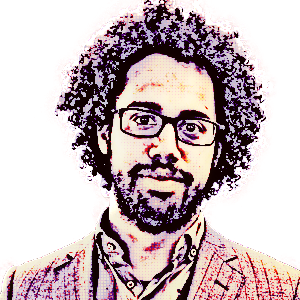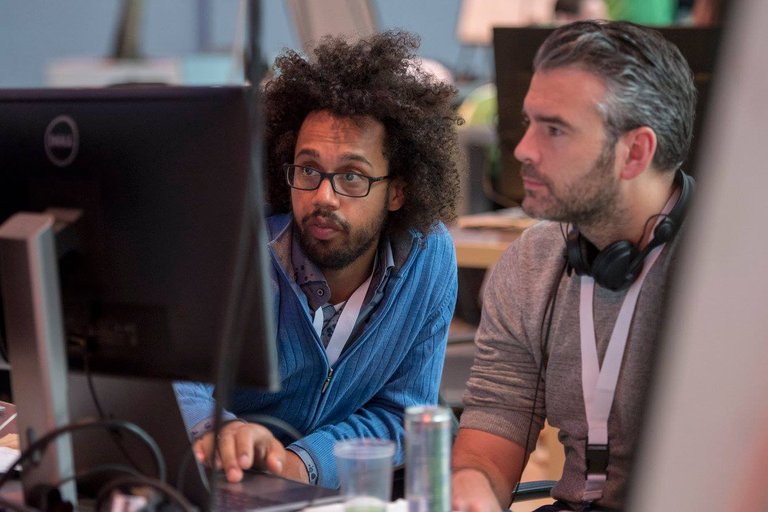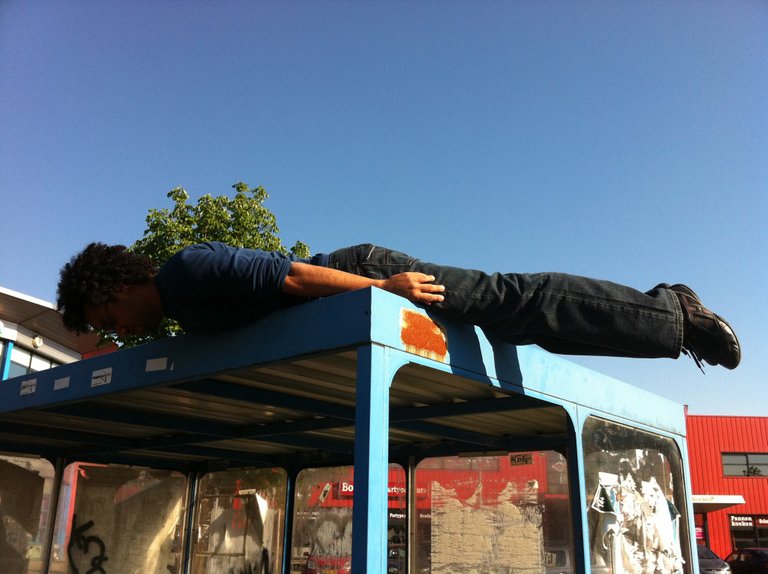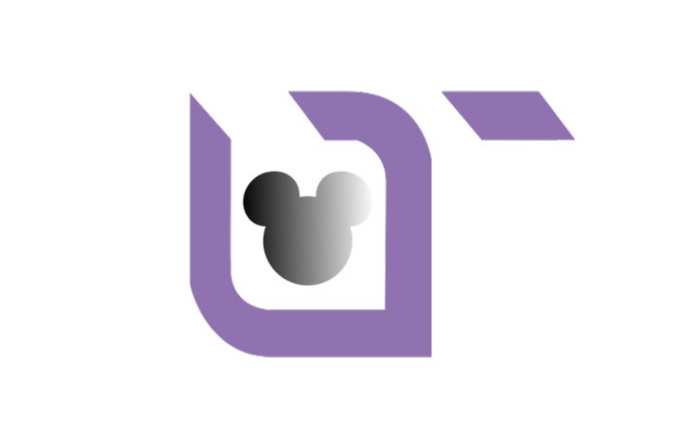Standing on the crypto shoulders of Coding Giants - with Arnold Daniels of LTO Network; by Mickey Maler


Arnold Daniels is an experienced web/software developer, Lead Architect, and the winner of First prize VenJ Blockathon 2017 from Amsterdam, who is more and more shifting his focus toward the technology of the blockchain.
He originally started as a database coder while studying at Haarlem Hogeschool. During the time of his study and a few years that followed, he helped to build and enhance several products and also take several projects to a new level, using his JavaScript, Node.js, MongoDB, AWS, PHP and MySQL skills; playing his role as Software Architect at Proactive Software, Lead Software Engineer at Cloud9 IDE, Co-Founder of Helder Hosting and Open Source Software Developer at Jasny.
Arnold is a Linux user and thus a keen enthusiast of the Open Source-way of developing software and working in the space where free distribution of innovative solutions, an exchange of creative ideas and encouraging people to use unique technologies can lead to changing the technological world as we know it and bring blockchain tech to current working business models.
Quoting Arnold directly, he is a guy who loves building things from the ground up, playing an essential role in their early successes or failures. He can't have it no other way.
With his versatile set of skills and hard-working attitude, he is a perfect match for his most recent project, LTO Network/LegalThings, where he acts as a Co-Founder, Architect, and lead developer; extracting those roles from a label of classical blockchain CTO and walking on his own visionary way of doing things.
The Interview
The Part - One
Hello Arnold, thank you very much for accepting my invitation for this little written up show! Can you please introduce yourself and tell us all something about what is your daily bread these days?
I’m the Lead Architect of LTO Network, a hybrid blockchain build for business. Born in 1981, making me not quite a millennial, but also not gen-x. I can still remember a time, before the internet and cell-phones, where few people even had a computer at home. Luckily, my parents understood that computers were the future and bought an 8086 XT in ‘85. Later my brother and I got a Commodore 64 to play and experiment with.
Now that I’m a father of two beautiful daughters of 4 and 6, I’m trying to do the same for them.
Since you are a Lead Architect, can you describe the meaning of your current title for us and tell us also, how your ordinary working day looks like?
We’ve split the roles of CTO and Lead Architect. I believe these roles are irreconcilable. As a tech lead, I switch between isolating myself in ‘the dungeon’ to think clearly and get in the zone, and talking with all team members as well as (potential) clients.
Currently, my focus is primarily on the private event chain and decentralized workflows.
There aren’t many ordinary days. On other days when nothing is working out, I feel it’s better to quit and clear your head. But when I’m in the zone I can easily keep on developing for 30 hours straight.
What are the top 3 characteristics that should have been possessed by every solid Lead Architect and what should be his possessions?
Understanding why and how people could be using the technology. For that, you need to listen closely and read between the lines. Doing as instructed is typically the wrong path.
For sure you remember that famous Bill Gates exhibition where he was demonstrating a new powerful feature in his Windows 98 which crashed into the Blue death mode right after he plugged the printer to it. Have you ever experienced something similar? A situation where everything works while you are compiling it at home and everything looks so good on the paper, but then nothing works when you are under the spotlight?
All the time, too many to mention. In a startup, it's common your still building till the last moment and that often goes wrong. Just roll with the punches.
Haha, Thank you very much! Ok, let's get a little warm up. Do you know how to save your work and exit the VIM editor? :)
Haha, yes just scream write quit. Unfortunately, I’ve had the ‘pleasure’ to have to work with many different editors. I prefer a full featured IDE.
Experienced Linux user, this Arnold! Ok, so, since you are the architect, let us draw something on the paper, shall we? .) Please, imagine that you and me, want to create something revolutionary and embrace the blockchain technology into it. My idea is to create a medium, which would allow Xbox, PS players and all other gaming platforms users to enjoy the same game at the same time, no matter what platform they would use for their playing session.
Do you think it's possible? What would we be in need for? Could all those side/cross/off- chains have been used and be combined with the multilayer approach, and create something useable for our case in the end?
Cross-platform gaming really doesn't require blockchain. As for in-game currency; Game developers currently are the centralized parties that can print money out of thin air. Also, the value is forever locked in the game, even if people stop playing. Without a huge demand from gamers, there isn't any insensitive to switch to crypto.
You as the Architect, have you ever been in a situation where people said that "something like this can not be done this way" or "this is an impossible task with our current roadmap/timeframe" or "this implementation won't make a sense"...and still, you found a way how to make it work? If so, please, give us an example.
That's not a common scenario. The default credo is “Arnold will figure out a way”.
It does happen though. At one point, a client required that all data was be hosted on-premise and managed by the IT dept of their organization. However, they wanted us to guarantee data integrity. The immediate response was “that's not possible”, but we found a way by using blockchain anchoring.
Yes, that's the definition of tuff live! But Arnold, let's take a look at from where have you started. One of your first involvement in the IT sector has been made via databases, where did you start with Access DB (database) which is a nonprofessional one but still functional and was quite edge cutting DB back in the day. Then you step up a bit towards MySQL which can be considered as close to the top ones; where did you communicate with DB server over a web interface, using PHP. You think databases evolve into something new these days or it's the same old structure with different security adjustments?
MS Access is a DB, search, UI, and script engine all rolled into one. We’re more and more stepping away from all-in-one solutions. For modern applications, it’s not uncommon to use several databases as well as standalone search engines and BI tooling to get more knowledge out of the information we have.
Looking at blockchain, we typically see this all-in-one approach. I feel that as blockchain matures, we’ll also move away from that, so on-chain data can be used any way we see fit.
How did you get into IT and when did hear about Blockchain tech for the first time?
A colleague was all into Bitcoin in 2010. He built a mining rig at home from some old computers. Unfortunately, I didn’t directly get it and didn’t look into it until much later.
Since 2008, Blockchain walked a long way. How did blockchain evolve in those 11 years and what is the most revolutionary and most developed feature of this technology so fat? For example, we know that Smart Contract has been involved in 94 by Nick Szabo and as we can sense in 2019 that this vital aspect of bc tech can already reach its practical limits these days (but of course, it's suitable for most cases anyway).
The most revolutionary development has been blockchain itself, as described in the original Bitcoin papers. Process since than has been slow. Bitcoin has always had scripting. The Smart Contract is ‘revolution’ just meant going from non-Turing-complete to Turing-complete complete scripts.
I feel that we haven't seen anything yet when it comes to the impact blockchain can have and that the most revolutionary advancements in this field are still ahead of us.
In which areas of today's world we can use Blockchain tech and its core strengths as a meta-technology for enhancing and challenging other already running technologies?
I would love to see blockchain replacing bureaucracy. Currently, trust in big organizations and governments is created through the bureaucracy. Enforcing strict procedures where many individuals are involved makes it hard to apply any form of favoritism. Similar to bureaucracy, blockchain adds inefficiency to provide these kinds of guarantees. However, these inefficiencies apply to computer systems and not humans.
The techniques used in blockchain technology are nothing new. The exciting part is how these techniques are smartly combined to create a trustless distributed system. Question is where are we okay with trusting another party and where do we desperately need a trustless solution? This is hard to answer as it differs from country to country, culture to culture and even person to person.
Where can you see Blockchain and Smart Contract practical limitations?
To enforce an agreement, a Smart Contract needs to lock-in the full value of the agreement as a deposit, as all parties are free to walk away from the contract at their convenience. This isn’t possible for many real-life situations, so we rely on authorities that can apply force (like throw you in jail and take all your stuff). While such authorities could exist on-chain, it goes against the true spirit of blockchain.

Blockchain can be used as a database in some cases. Even though this is not the best possible use case for blockchain tech, can you find a spot DB area where it could have been beneficial?
Storing data in a distributed way prevents altering history. So this might be beneficial for public records, preventing a 1984’s Ministry of Truth from becoming reality.
What is the smartest use of blockchain tech you have ever seen and what do you think blocks this tech from getting adopted on a larger scale?
The smartest use is without a doubt the original use of Bitcoin; a digital currency. This was attempted many times before without success.
The anarcho-capitalism ideas that are prevalent in the crypto community are holding mainstream adoption back. To move further, we need to look at how businesses and governments can apply blockchain to improve the current system.
What would be your answer to this question: “How would you describe a word “permissionless private chain” in plain English” ask by a 27-year-old charismatic girl who is trying to pick up you at the grocery store (you can see her holding a Rolling Stone magazine with your slightly edited LinkedIn Picture as a central theme on the Cover-up of the magazine)? And please, a famous statement like: “There is no spoon" is currently prohibited.
Trying to keep the conversation just friendly, not to get in trouble with the wife.
When you have a disagreement with a company, they hold all the cards. Ever tried to explain a situation, just to hear “that’s not what our computer says”? With a permissionless private network, you have your own copy of the data, each piece of data has a unique fingerprint and based on that fingerprint thousands of computers will vow for you that the information you have is real and correct.
Your most recent project, LTO Network (Liquid Tasks Orchestration), is pretty unique in a way it founded it's a way towards blockchain. Instead of going from a whitepaper to a product, LTO Network made a product on demand and created a blockchain based project out of that. Can you tell us when exactly have you known that you will be in need of blockchain for stepping the game up?
We pretty much fell into the blockchain space. We started using anchoring because we needed to ensure the integrity of data we didn’t control. For almost all clients, this was the first time they even heard about blockchain and now they were using it, albeit in a very modest way. From there we get requests like “Can we replace our current paper agreements with smart contracts?”. So we started doing research and found out that the technology didn’t meet the need of our clients and that our existing software could be easily modified to run decentralized. That’s when we realized we had a great opportunity.
You agreed to use something of Waves technology in this project.
What functionality did LTO Network borrow from Waves to make LTO work better?
LTO is a hybrid solution with a public and private chain. The private chain is based on our original centralized software. The public chain is based on Waves.
However, the story starts with NXT, one of the earliest blockchain that wasn’t forked from Bitcoin. Where Bitcoin is very flexible by using scripting for transactions, NXT is very rigid with hard-coded transaction types. This allows the blockchain to be optimized towards this limited functionality. Waves improved upon NXT with a much stronger PoS algorithm and by applying the NG protocol, which greatly increases the transaction speed and capacity. We, in turn, are limiting the functionality, even more, optimizing the blockchain for storing hashes. Also, we’re making adjustments to the consensus model in order to battle centralization.
Is LTO Network considering to cooperate with another blockchain project or embracing its technology in similar manners as it was with Waves?
Not in the same way as Waves, but we definitely plan to collaborate with other blockchain projects. We’re very interested in projects with authentication solutions. We’re doing a showcase with NuCypher, but I doubt it will stop there. There are many potential use cases for combining NuCypher with LTO Network.
Please, can you describe what is the mission of LTO Network and how can other companies/governments profit from your solution?
We want everyone to be able to collaborate on a level playing field.
Typically in automation, the biggest party, whether it’s an enterprise or government, build the ‘master’ system and all other parties can use that system, possibly connecting via an API. This means that all parties rely on and need to trust the information this system provides.
When parties don’t want to rely on trust, automation doesn’t happen and we see parties relying only on their own systems and using old-school methods like e-mail, phone and even fax to communicate.
With LTO these systems can connect and work together in a trustless way.
That's really nice, Arnold. Since I work as a Technical Writer at Red Hat, can you Imagine Red Hat or IBM using your product? How could this cooperation look like? Do you think those two companies could be a proper customer for LTO Network?
Process automation has come a long way in the last two decades and companies like Red Hat and IBM have played a big role in that. However, the focus has primarily been on automating internal processes. The next step is automation of cross-organizational processes. IBM and Red Hat can combine their existing solutions with LTO Network to make that leap.
Is there some new partnership or potential customer somewhere on the horizon?
We don’t like to talk about potential clients and partners.
As far as a new (already announced) partnership goes, I’m pretty excited about the project we’re doing with IBM Watson, where we add machine learning to a decentralized workflow.
What about exchange listening possibilities. Is there an exchange you would like to cooperate with or possible plan for getting listed somewhere else in close future?
I’m really not involved in this part of the project. It would be useful for businesses to purchase LTO directly via their bank account or with a credit card. First having to purchase Bitcoin and then going to exchange is too big of a hurdle for our target audience.
Yes. A FIAT Gateway would be lovely. Which governments are or could be involved with LTO Network somehow?
In Europe, countries need to collaborate but want to keep their sovereignty. We’re running a project that involves the Belgian and Dutch government, with the other surrounding countries also taken an interest.
Regarding your current profession, what is your point of view on the open source way of creating software? Hyperledger, for example, is doing pretty great progress this quartal, sealing their partnership with another successful blockchain based project Quant Network and their Overledger OS. Can you imagine cooperation with one of those names or to be contributing to those open source platforms?
Blockchain is all about the trustless operation. This can only happen if the code is open-source and can be checked by peers. In practice all blockchain projects are open-source, this isn’t limited to Hyperledger projects.
To be honest, I feel that Hyperledger projects are being snowed over by Fabric. You’d be surprised how little people know that Hyperledger is an umbrella project and not just Fabric.
Hyperledger projects benefit from funding via the Linux Foundation. We don’t need that. LTO is a healthy company with paying clients and well-functioning tokenomics.
So never say never, but there aren’t any plans to join the Hyperledger.


(Prefer Tequila) at Telegram or shoot a shouted "Tweet".
Never stay tuned
With respect, Mickey
Congratulations @mickeymaler! You have completed the following achievement on the Steem blockchain and have been rewarded with new badge(s) :
You can view your badges on your Steem Board and compare to others on the Steem Ranking
If you no longer want to receive notifications, reply to this comment with the word
STOPTo support your work, I also upvoted your post!
Vote for @Steemitboard as a witness to get one more award and increased upvotes!
Congratulations @mickeymaler! You received a personal award!
You can view your badges on your Steem Board and compare to others on the Steem Ranking
Vote for @Steemitboard as a witness to get one more award and increased upvotes!